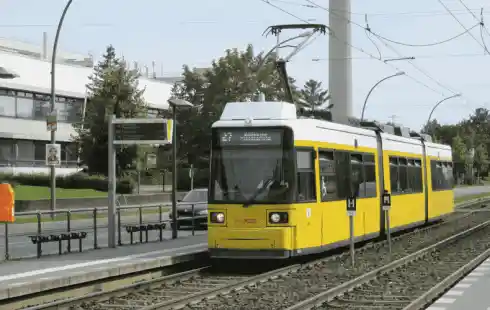
Fully Funded Scholarship Opportunity at the Bavarian International School for 2026-27
Section: News
 As a tumultuous week for commuters draws to a close, warning strikes in local public transport have unfolded throughout numerous German cities today, impacting buses, subways, and trams. The Verdi union, engaged in a protracted collective bargaining dispute spanning 15 federal states, aims to intensify pressure on employers through these strikes. Over 80 cities and approximately 40 districts are witnessing disruptions, with the exception of Bavaria, where ongoing collective agreements have averted strikes.
As a tumultuous week for commuters draws to a close, warning strikes in local public transport have unfolded throughout numerous German cities today, impacting buses, subways, and trams. The Verdi union, engaged in a protracted collective bargaining dispute spanning 15 federal states, aims to intensify pressure on employers through these strikes. Over 80 cities and approximately 40 districts are witnessing disruptions, with the exception of Bavaria, where ongoing collective agreements have averted strikes.
Berlin's largest local transport company, Berliner Verkehrsbetriebe (BVG), is participating in the strike, but its duration is limited until 10 a.m. In contrast, most other locations will experience an entire day of industrial action, as emphasized by Verdi.
The warning strikes are expected to have a significant impact in North Rhine-Westphalia, the most populous federal state, where around one-third of the 90,000 affected employees nationwide are located. Despite being centered in North Rhine-Westphalia, the repercussions will extend to various regions, especially in larger cities.
Verdi's recent call for nationwide air traffic strikes and the premature conclusion of the German Locomotive Drivers' Union (GDL) strike at Deutsche Bahn have heightened tensions. These events have led to widespread disruptions in air and rail transport, setting the stage for the ongoing public transport strikes.
The latest dispute primarily affects schoolchildren and rush-hour commuters, compelling them to seek alternative transportation options or work remotely. Notably, Aachen and the Mannheim-Heidelberg-Ludwigshafen region remain unaffected.
The root cause lies in parallel collective bargaining negotiations across almost all federal states, with a focus on improving working conditions for employees. Verdi advocates for shorter working hours without financial losses, extended rest periods between shifts, additional vacation days, and increased vacation pay to enhance the attractiveness of the job and alleviate the burden on employees.
In response, employers acknowledge the need to modernize and enhance attractiveness in the labor market. Simultaneously, concerns about increased workloads for existing staff and higher costs due to reduced working hours are voiced.
Negotiations for higher wages and salaries are underway in Brandenburg, Saarland, Saxony-Anhalt, and Thuringia. In Brandenburg, Verdi is pushing for a 20% increase, demanding a minimum of 650 euros more per month for employees. The proposed term for the collective agreement is one year. Hamburg is also engaged in negotiations for a new collective agreement for its transport companies.

Section: News

Section: Arts

Section: Health

Section: Fashion

Section: Politics

Section: Fashion

Section: News

Section: Fashion

Section: Arts

Section: Politics
Both private Health Insurance in Germany and public insurance, is often complicated to navigate, not to mention expensive. As an expat, you are required to navigate this landscape within weeks of arriving, so check our FAQ on PKV. For our guide on resources and access to agents who can give you a competitive quote, try our PKV Cost comparison tool.
Germany is famous for its medical expertise and extensive number of hospitals and clinics. See this comprehensive directory of hospitals and clinics across the country, complete with links to their websites, addresses, contact info, and specializations/services.
Join us at the Kunstraum in der Au for the exhibition titled ,,Ereignis: Erzählung" by Christoph Scheuerecker, focusing on the captivating world of bees. This exhibition invites visitors to explore the intricate relationship between bees and their environment through various artistic expressions,...



No comments yet. Be the first to comment!